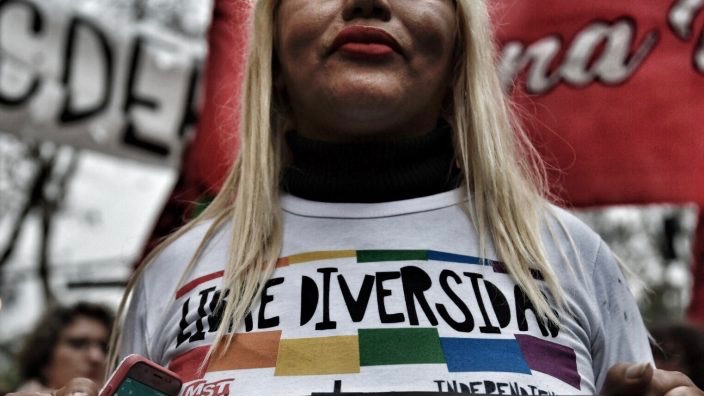Today is the first day of the 34th Plurinational Encounter of Women, Lesbians, Transvestites, Transgender and Non-binary People will be held in the city of La Plata, Buenos Aires province, Argentina and continue until October 14. In the electoral year and on the land of Querandí Indigenous people, the meeting will address the debates, challenges and unanswered questions, that are both collective and individually asked by thousands, in one of the most important social and political events in the global movement of feminist liberation.
In the last four years, at least from the ‘Southern Cone’ in Latin America, a new feminism emerged that felt uncomfortable with the corset of the ‘women’s agenda’ and that in all the public spaces began to demand that its proposals -many that emerged in the Encounters- were at the forefront of politics, despite the attempted co-optation of their demands by the right-wingers. The same was proved when the feminists organized the “National Strike of Women, Lesbians, Transvestites and Trangender people” against the neoliberal policies of the government of Mauricio Macri and the “Feminist Forum against G20”.
During the past four years, the time period in which Argentina experienced a crisis by following a model of financial speculation, the feminist movement never left the streets and demonstrated -raising relevant and historic banners- against femicides and machista violence, for legal abortion, for food sovereignty and against neoliberal extractivism that destroys the land. The feminist movement took part in the massive mobilizations demanding the return of disappeared activist Santiago Maldonado alive. It built true resistance to fascism in Latin American and the Caribbean, while maintaining the old or building new alliances with the ecclesiastical, catholic and evangelical conservatism that threatens to destroy the access to rights achieved after years of struggle across the region.
We, the Plurinational Encounter, are making history
Although the history of the Encounters goes back 34 years, there are many different stories that weave their journey. For example, ours, the one that we share as an organized collective and that begins five years ago in the Encounter in Salta in 2014. A year earlier, in San Juan, hundreds of thousands marched against Barrick Gold Corporation, along with the inhabitants of San Juan who were their struggling against mega-mining project. At that time, the Latin American Bureau of Feminists served as an organization to know and share the situation of the comrades from other countries and expand the framework of feminist strategies and complicity because we want to be free and plurinational!
The following year, the Encounter was held in the city of Mar del Plata, in the Buenos Aires province, which was governed by Daniel Scioli. The location facilitated the concentration of many more people and we carried out one of the largest marches that took a tour of the whole tourist city. For the first time, the operation of the repressive forces was fierce and became apparent and more hostile towards the end of the march when the protesters were brutally attacked. In complicity with a neo-Nazi group, “the cathedral became a police station”, introducing a mentality -which intensified during the government of Cambiemos party- of “hunting” in the massive spaces to faciliate the dispersion of movement and introduce fear to curb the participation of others.
The first “Ni Una Menos” and multitudinous marches saying a collective “Enough”, motivated us to hold the 31st Encounter in Rosario, which was a key meeting until this moment and which showed us with certainty that we could continue to grow. We knew that transition processes have their time but we collectively accepted the challenge that in less than two years it would be massive. With the proposal to continue sharing our popular views of the Encounters we conducted a workshop with the comrades of the Moreno Neighborhood as well as with feminist journalists to reflect on the image that media corporations made about us and to conspire together on the alternatives.
The 32nd Encounter was held in the northwest of the country, in Chaco. Women shared the repeated stories of violence without any institutional qualms, seeking the support of their international comrades. We met with Miriam Miranda from Honduras, who took advantage of the Encounter to denounce the situation facing the land defenders in Central America and on that occasion, we learned how elections change our goals. Like how friendly Domingo Peppo’s government behaved, it welcomed women with open arms -something contrary to its daily mistreatment of its citizens- so that there was no institutional repression on his part. However, towards the end, we were caught in a moment of violence from “citizens” against the fellow comrades who were organizing to return. We were able to see that opposition parties controlled people to incite chaos. Also, at the end of this meeting, we received the news that Santiago Maldonado’s body had been found after months of confusion after a fierce repression in defense of Indigenous Mapuche land.
The well-known violence of the Gendarmerie in the Mapuche territories and the murder of Santiago Maldonado and Rafael Nahuel transformed into the 33rd Encounter in Trelew, in support of and accompaniment to the Indigenous sisters that we had not seen until then. Discussions over the self-determination of people, construction of autonomy and the need for anti-colonial reflections enabled a proposal that is central this year, i.e., “We are plurinational”. Discussing about nations and border violence is like abolishing one of the oldest impositions of the heteropatriarchy. A way to continue moving forward.
**Gender dissidents refers to all those who do not subscribe and rebel against the cis-normative gender binary.
Article written by Camila Parodi y Laura Salomé Canteros part of the Collaborative coverage of the #34Encounter; English translation by Tanya Wadhwa





